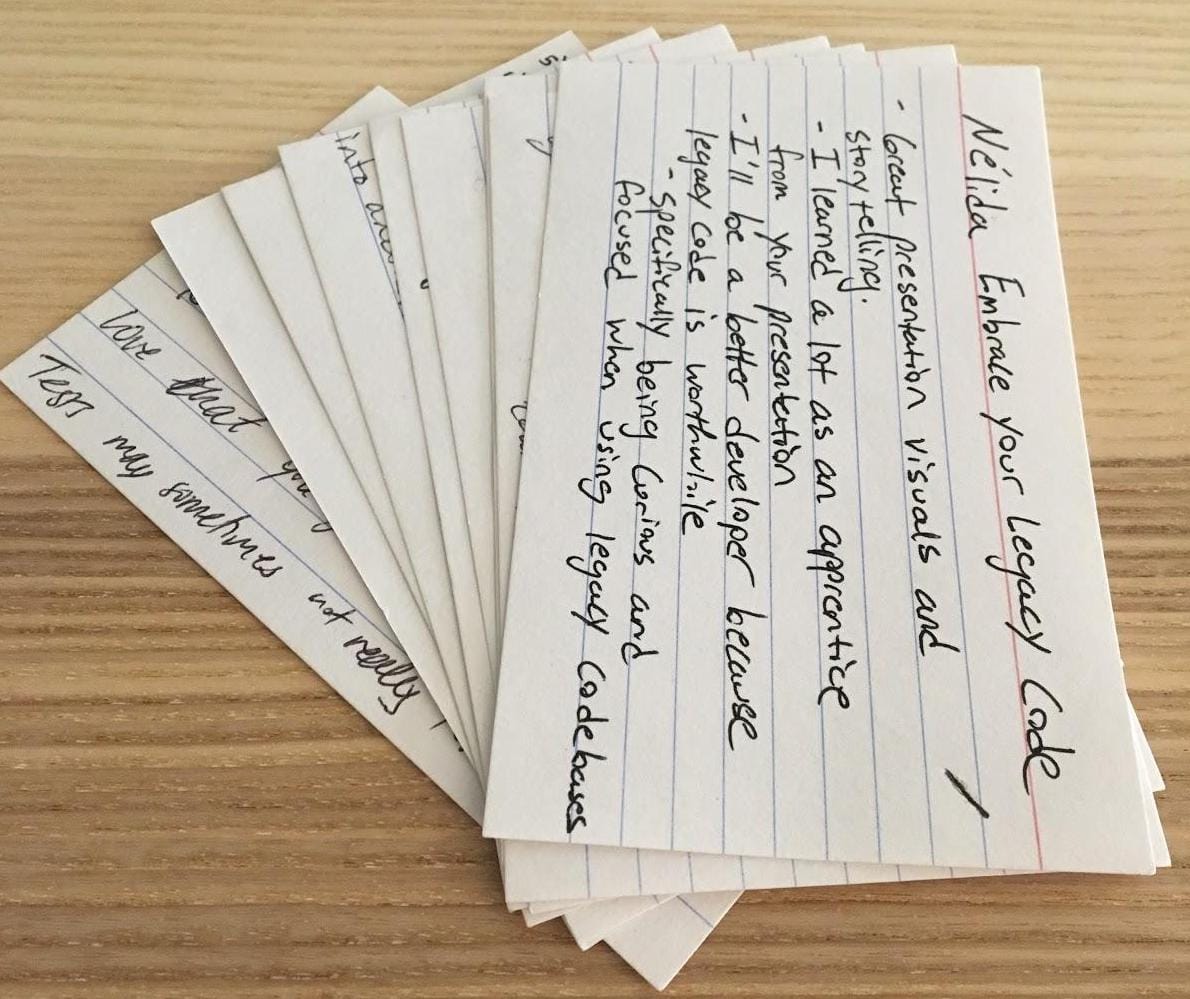How I Survived My First Conference Talk as an Introvert
I have always considered myself an introvert and as such I never thought it was possible for me to speak at a conference, especially at an International conference in a language that is not my native language.

I have always considered myself to be an introvert, and as such I never thought it was possible for me to speak at a conference. To take it a step further, I am a native Spanish speaker. So, as an introvert, and with English being my second language, I never thought it was possible for me to speak at a conference in English.
I don't remember when I decided that I wanted to speak at a conference, but it probably started in 2016 when I attended my first conference, try! Swift. I had such a good time meeting new people and watching a bunch of great and inspiring talks that I continued attending conferences after this and the thought of speaking on day kept coming back to me.
It wasn't until I started working at Detroit Labs that I made a serious plan. The possibility seemed more tangible after a lot of conversations with a mentor (Erika Languirand) and other amazing women at Labs who regularly speak at conferences. A little push and tons of inspiration from them was enough for me.
After a long process, I finally made it. I presented my first conference talk, Embrace Your Legacy... Code on stage at NSSpain -- in English! It was such an amazing experience that I felt compelled to share my process and thoughts in hopes that it can help people who want to speak at a conference but don't know how or where to start.
I don't have anything to talk about.
I used to say this to myself all the time. It was probably the biggest roadblock and what prevented me from even giving it a try. I kept thinking: Even if I get the courage to stand in front of a lot of people, what am I going to say?

As I mentioned earlier, my mentor was a huge advocate and helped me to find ways in which I could come up with a subject. Some of the questions she asked me were:
- What are you learning or would like to learn?
- What are you working on right now in your current project?
- What problems are you facing or have you solved lately?
- What are you reading these days?
Answering these questions helped me to start coming up with ideas, some better than others. I didn't actually do anything with many of these ideas, but it was a good opportunity to think a little bit more about each one of them and ask myself things like:
- Am I really excited about this one?
- How much do I know about this topic? (Which it isn't a problem at all, it just impacts in how much time you will need to invest)
- Have I seen talks about this topic?
- If so, what is unique in the perspective I want to offer?
At some point I focused on a couple of subjects, Acceptance Tests and Core NFC, which I presented at local meetups and to my company. These were really important to start practicing and build my confidence, but neither of these made it to the conference stage.
You are probably wondering: Why didn't you present either of these as your first conference talk?
Well, I probably could have, but at the time I didn't think it was something that other people would find interesting (which is my bad, I was just assuming things). Also, looking back, I can say for sure that I wasn't as excited about those topics, so in the end I think it was a good decision.
If you think you've found your topic, continue on to the next steps! I had to try a few different topics before I found the right one, but maybe you will find yours right away.
When it comes to brainstorming conference topics, be observant of all the things you like, know, and do on a daily basis. Sometimes the right topic is the most obvious one, or at least it was in my case.
Ok, I have my topic. Now what?
Some people start by writing their proposal or picking the conference once they know what to talk about. I decided to lay out what I wanted to communicate, and then apply.
1. Draft what you want to communicate.
I immediately started pouring my ideas into a document, researching more about the topic and looking at different perspectives. In a way, I feel that's how I knew it was THE topic. Many of these ideas were not really connected to one another, but it didn't matter; I just wanted to have them somewhere to go back later and elaborate more.
To this list, I added links, references to books, and even quotes, then I started thinking about the questions I wanted to answer in this talk, and used them as a guide to know how to structure my talk. These are some of the questions I added for my Legacy Code talk:
- What is Legacy Code?
- What has Legacy Code taught me?
- How do I approach Legacy Code?
- How do I leave a good legacy?
All of these questions helped me start separating ideas, adding new ones, and gain a better sense of what exactly I wanted to communicate.
In the end, I didn't use all of the ideas or even all of the questions that I first wrote, but this exercise was extremely useful. Looking back, I can say it was the foundation for the next steps. Writing the proposal and the talk itself was way easier because I had this information readily at hand.
2. Write your proposal
Once I knew exactly what I wanted to say and how I wanted to say it, it was time for me to write a proposal and start submitting my talk.
Here is where I started reading a bunch of articles about how to deliver a talk and how to write proposals, like this one. I even attended a meetup where they help you with all things related to speaking at conferences. Pretty cool, huh?
My first step was reading a ton about how to write a good proposal. I suggest doing a quick search on Google which will give you a bunch of articles that explain in detail what to do and where to start.
Along with the information I had from Step #1, reading about writing proposals was useful because that helped me to come up with a first version. However, there was a critical next step: asking for feedback and talking to someone about my ideas. Let's explore each of these tasks in detail.
3. Ask for feedback.
At Labs we have people that have experience at speaking at conferences and we have a Slack channel where we can ask for help regarding this topic, so I sent my first draft there and to a few other friends. I iterated over their feedback multiple times by modifying things and asking for feedback again for the new version. I did this until I was finally satisfied with the proposal.
Advice: You don't have to apply every single piece of feedback you get, just take what makes sense to you.
4. Discuss your proposal with someone
In addition to asking for written feedback, I had a conversation about my proposal with my mentor, who happens to be an awesome speaker. She helped me to discuss my idea and ask more specific questions about the topic. This ultimately led me to a more detailed and keen proposal.

If you don't know anybody with public speaking experience that can mentor you, you can try searching for meetups like the one I mentioned above where you can hopefully find a mentor or at least connect and discuss with other people that have this same interest.
If you can't find a mentor, find an advocate. This person doesn't necessarily need to have experience in public speaking, they just need to believe in you and be willing to listen you. This could be your friend, your partner, or someone from your family. If they are at least a little familiar with your topic, that's a bonus.
For me, one of my best advocates was my partner. He used to sit and patiently hear all my ideas, ask questions, and give me feedback all the time. The support that he offered me at every step was incredibly important.
5. Submit your proposal
Submit everywhere! Seriously.
I initially did all this work because I had my eye on one of my favorite local conferences, so I only submitted there -- and I was rejected. Rejection hit me pretty hard despite all the warnings I had read about this feeling in many articles.
Ultimately, I shrugged my shoulders and kept moving forward. I started looking for more conferences and submitted to every single one that seemed interesting to me, even the ones that I considered "big".
In total, I submitted to 10 conferences. I got accepted to four and I ended up accepting the offer to speak at two. One of them was NSSpain, the one where I considered my talk least likely to be accepted. So there you go: don't be afraid to dream big.
My first recommendation here, especially if you are part of an underrepresented group, is to check that the conference has history of having a diverse set of speakers. This is important because first, we all should advocate for diversity, and also because it will make your experience a whole lot better -- or at least, that's how I personally felt when I realized that I wasn't the only woman and that I wasn't the only person of color in the room. That definitely made me feel more safe and helped to overcome the feeling that I sometimes had of not belonging there.
My second recommendation is to make a list of the conferences where you are submitting your talk. I have very bad memory and this helped me to keep track of my submissions to avoid double-submitting, and also just to understand where am I, where I've been rejected, which ones I still have hope of acceptance for, etc.
6. Write your talk
Hopefully what you wrote in the first step will be super useful here. Mostly your task will be translating that into slides.
I'm not going to talk a lot about this process because there's already a lot of information out there. Again, one of my favorite resources is this one.
My only recommendation here is starting with this step right away. Don't wait until you get accepted into a conference (don't worry, you will, eventually, just keep submitting). This will give you plenty of time to work on the slides, practice, ask for feedback, refine, and keep iterating based on that feedback.
7. Practice and ask for feedback
Did I say I'm an introvert? Well, not only that, English is not my native language and I really don't like my accent much, so I can't stress enough how important was for me to ask for feedback and practice my talk multiple times.
At Detroit Labs, we have a group called Conference Club where you can practice your talk and people will give you feedback. If you feel safe among your coworkers this is an excellent way to start getting feedback.
Another great way I got feedback was by practicing in this meetup. Aisha, the organizer, gave the participants blank cards where they could write any feedback they had for me after listening my talk. The feedback was anonymous.

Having this written feedback was a huge help, because I was able to take it home and review each point carefully and make changes in my talk accordingly.
If you don't have any of these options available, I would suggest submitting your talk to any other meetup. You can take these blank cards with you and politely ask the audience if they will be willing to do this for you.
If you don't feel comfortable allowing strangers to potentially be rude with you, organize a lunch and learn or a small gathering with friends and colleagues that you trust and go through this exercise with them.
I probably spent a month and a half just practicing, whether it was by myself talking to the void, in front of my partner (he probably memorized my talk, too), or at meetups and in lunch and learns at Detroit Labs. In my opinion, over-practicing doesn't exist. I can say it definitely helped me to feel more confident once I was on stage.
8. During the conference
At this point, you have worked very hard on this talk and probably have spent lots and lots of time ensuring everything is in place, so from now on make sure enjoying the conference is your number one priority. After all, this moment is part of your reward for having the courage to stand in front of hundreds of people, so take the time to really appreciate it and enjoy it.
If there are events around the conference, I highly encourage you to go and meet new people. If you are an introvert like me, this can be difficult, but a conversational trick that always works for me when I don't know where to start is: Hi, My name is Nelida. How are you? I don't know how, but I swear it works.
Attending these events helped to distract me a little bit and made me forget how nervous I was about the talk. I remember that when I was on stage I felt, if not more confident, at least more happy to know that among the people listening, there were now a few new friendly faces.
Finally, just focusing on enjoying and learning from the other talks as if I was a regular attendee helped to dissipate some anxiety.
For the night before your talk, I recommend taking time to unwind, relax, and sleep well.
9. After the talk
Once you are done with the talk, you have even more reason to keep enjoying the conference and meet more people! Stick around, because most likely some people might want to talk to you about what you just presented.
If you can, I would suggest uploading your slides somewhere. I didn't do this right away and some people asked afterward. I used Speaker Deck for this, but you can also try other platforms.
Finally, don't forget to post or retweet a video if there is one; it's a great way to reach more people. After all, we do this to share our knowledge and experiences! Here's mine:
